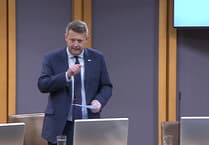Cuts to public services in Wales are likely to have a disproportionate impact on women and low-income families, the Senedd’s finance committee has heard.
MSs continued taking evidence on the Welsh Government’s draft budget for 2024-25 on Wednesday, 10 January.
Jessica Laimann, policy and public affairs manager at Women’s Equality Network Wales, raised concerns about the sufficiency of funding for councils.
She told MSs that women are more likely to rely on social care, childcare and housing.
Ms Laimann warned that women are likely to bear the brunt of cuts to budgets for childcare, and equality, inclusion and human rights.
“There is a critical need for affordable childcare,” she said.
“High childcare costs are compounding the financial pressures for families, pushing parents – especially single mothers – into debt and poverty.”
Hardship
Victoria Winckler, director of the Bevan Foundation, said there has been no easing of pressures, with continued reports of significant levels of severe hardship.
“If anything, the outlook over the next few years is even worse,” she warned.
She raised concerns about lost investment in services which help prevent poverty.
Dr Winckler was disappointed that funding was not available for the recommendations of a report by an expert group on the cost-of-living crisis, of which she was a member.
Asked if the group’s work had any impact on the budget, she said: “If it has, it’s hard to see.”
Dr Winckler urged the Welsh Government to take a longer-term approach to budget setting.
She criticised delays to, and the scale of, the Warm Homes Programme, with Ms Laimann adding it is often women making heartbreaking decisions between eating and heating.
Inflation
Peredur Owen Griffiths, who chairs the finance committee, asked academic experts about the impact of inflation.
Guto Ifan, a lecturer at Cardiff University’s Wales Governance Centre, estimated the hit to the Welsh budget at £800m-£1.5bn depending on the measure of inflation used.
Ed Poole, also a lecturer at the Wales Governance Centre, said the Welsh Government has found an extra £852m to spend on the NHS, offsetting the impact of inflation.
He explained that the local government settlement has been topped up by £269m which leaves an inflationary hit of about £145m.
Dr Poole said: “That, of course, means that everything else in the budget is taking more of a proportionate hit from the impact of higher inflation. That’s probably about £600m.”
David Phillips, an associate director at the Institute for Fiscal Studies, who is from Wales, said non-education council services have seen above-average rates of inflation.
‘Untouchable’
Labour’s Mike Hedges raised concerns about “untouchable” areas of the Welsh budget in addition to the NHS and the revenue support grant for councils.
The Swansea East MS raised the examples of rail, enterprise zones, and farm payments.
Dr Poole told MSs a subsidy was needed due to a fall in rail passenger numbers.
Mr Phillips added that ScotRail has not required a similar in-year top-up as he estimated the subsidy for Transport for Wales at £13-14 per passenger journey.
Turning to farming, he said basic payments have been frozen, representing a real-terms fall, and there has been a big cut in planned spending on rural development.
‘Sacrosanct’
He warned: “If the basic farm payments are seen as sacrosanct, that does limit the ability to shift funding more towards the sustainability and economic development front in rural areas.”
Mr Phillips told the committee there has been a shift away from spending on prevention, with cuts to substance abuse and mental health schemes.
Mr Ifan said he could not imagine NHS spending in England rising by only 1% as planned, saying he expects the UK Government to trigger more consequential funding for Wales.
Mr Phillips said the 2020s have seen a reversal, with council spending under more pressure in Wales than in England.
MSs also took evidence from representatives of the Office for Budget Responsibility on its latest independent forecast for devolved Welsh taxes.





Comments
This article has no comments yet. Be the first to leave a comment.